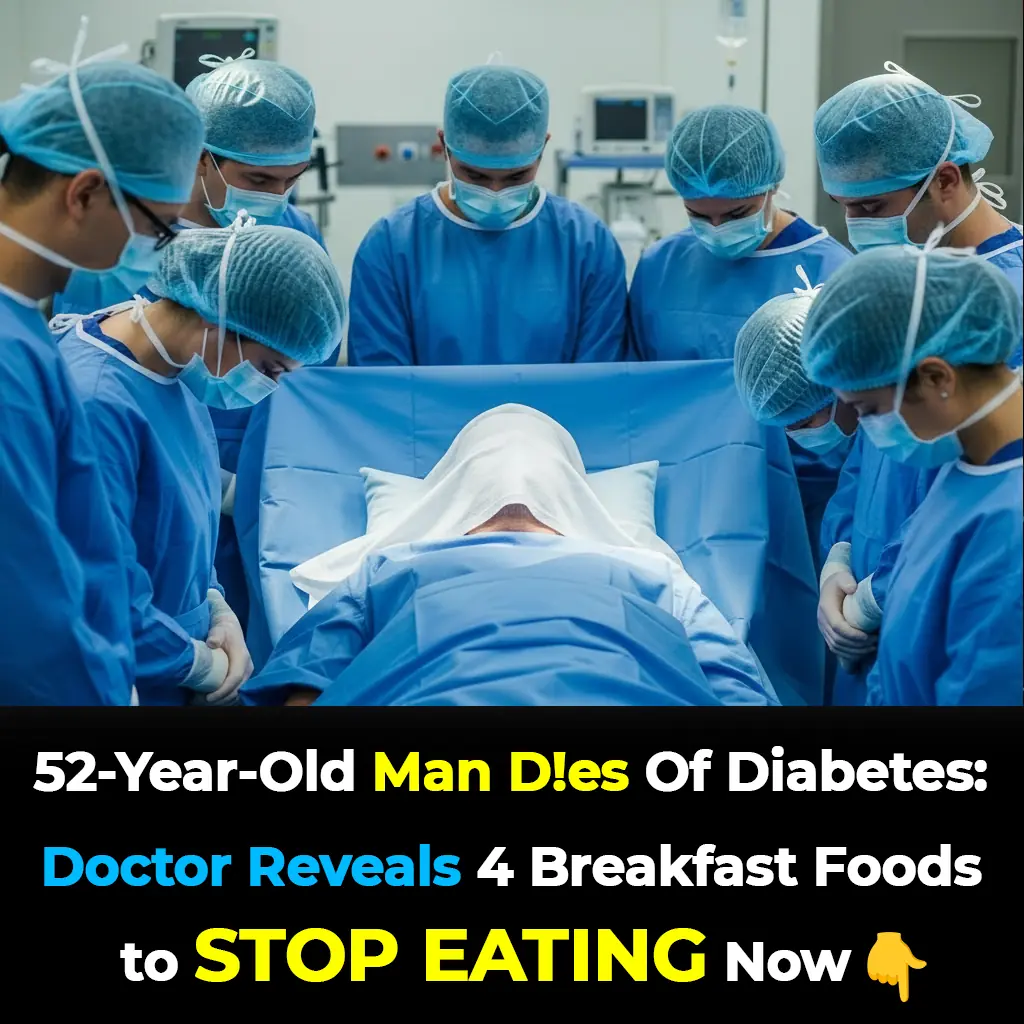
Eating Breakfast Too Late May Shorten Your Life: New Study Reveals a Hidden Risk for Older Adults
Breakfast has long been called “the most important meal of the day,” but researchers now suggest that when you eat it may be just as important as what you eat. In older adults, delayed meals often reflect health challenges such as fatigue, reduced appetite, or underlying conditions that interfere with normal routines. According to Dr. Hassan Dashti, a nutrition scientist and circadian biologist at Massachusetts General Hospital and Harvard Medical School, mismatched eating schedules can disrupt the body’s natural rhythms.
“When food arrives at a time the body doesn’t expect, like late at night or much later in the morning, it can disturb sleep, metabolism, and other biological processes,” Dr. Dashti explained. “For younger adults, these disruptions may have a smaller effect, but for older adults, they can translate into a meaningful health burden.”

Inside the Study: 22 Years of Data
The research, published in Communications Medicine, analyzed nearly 3,000 older adults in the UK, tracked for an average of 22 years. Participants, who entered the study around age 64, regularly reported their eating schedules, lifestyle habits, and health conditions between 1983 and 2017.
Some participants also underwent genetic testing, allowing researchers to explore links between meal timing and traits such as “eveningness” (a natural tendency to prefer late nights) and obesity risk. They also completed questionnaires about sleep quality and underwent repeated assessments of physical and psychological health.
The results were striking:
- Later breakfast times were strongly linked to both physical and psychological illnesses such as fatigue, poor oral health, depression, anxiety, and multiple chronic conditions.
- Mortality risk was higher among participants who consistently ate breakfast later in the day.
- A survival analysis showed a clear gap: 10-year survival rates were 89.5% in the early breakfast group versus 86.7% in the late group.
While the percentage difference may appear small, researchers stress that it represents a meaningful population-level effect, especially given the large sample size and long follow-up.
What the Findings Really Mean
Importantly, the researchers clarified that the results do not prove eating later causes death directly. Instead, a delayed breakfast may serve as an early warning sign of broader health decline. Older adults may eat later because of low energy, poor appetite, or other medical conditions, making breakfast timing a sensitive indicator of overall health.
Interestingly, genetic profiles tied to eveningness — but not obesity — were associated with later meal schedules. This suggests that while natural “night owl” tendencies can play a role, environmental and health-related factors are likely the bigger drivers in older adults.
Practical Takeaways: Consistency Is Key
Dr. Dashti and colleagues emphasize one main message: consistency matters. For older adults, maintaining a regular meal schedule with an earlier breakfast may support better metabolic health, stronger circadian alignment, and healthier aging.
They recommend:
- Avoiding skipped or heavily delayed breakfasts unless guided by a physician
- Monitoring appetite changes or unexpected weight loss, as these may flag underlying health problems
- Encouraging earlier meal times where possible, especially for breakfast, to better align with the body’s internal clock
Monica Dinu, PhD, a nutrition expert from the University of Florence, praised the study, noting that it adds to evidence showing the benefits of aligning meals with circadian preferences. She suggested that healthcare providers should pay closer attention to meal timing in older adults, not just diet quality.
The Bottom Line
The study doesn’t mean that one late breakfast will harm you, but it underscores a powerful truth: in later life, when you eat could be as critical as what you eat. For older adults, an early, consistent breakfast may serve as a simple yet powerful tool to support longer, healthier living.
News in the same category


The Harmful Effects of Squatting Over a Toilet 🚽

Rare Body Features That Show Just How Incredible the Human Body Is

Proven Health Benefits of Dates

Man Suffers a Stroke from Bathing After a Meal: 3 Things You Should Never Do

5 Warning Signs of a Dangerous Stroke and the 4 Groups Most at Risk

Waking Up at Midnight: Husband Complains of a Headache, Wife's Quick Thinking Saves His Life

Doctors finally reveal the BENEFIT of one egg a day

Largest-Ever Individually Randomized Trials Show High-Dose Flu Vaccines Reduce Hospitalizations
In short, these studies suggest that a stronger flu vaccine does far more than ward off seasonal sniffles—it can save lives, ease pressure on hospitals, and even protect the heart.

Unexplained Bruising on Your Body: Causes and Treatments

7 Resistance Band Ab Moves That Torch Belly Fat and Build Core Power
This variation transforms a simple bridge into a powerhouse move, strengthening not only your glutes but also your deep core muscles, lower back, and hip stabilizers.

8 Superfoods That Naturally Lower Cholesterol and Protect Your Heart
It’s about making gradual, sustainable swaps—cutting back on processed foods, replacing saturated fats with healthier ones, and prioritizing fiber-rich, nutrient-dense ingredients.

10 Life Saving Tips for Lowering Stroke Risk & Early Signs of Stroke

Proven Health Benefits of Eating Eggs Based on Evidence

80% of Heart Attacks Can Be Prevented—Just Do These 5 Easy Things

52-Year-Old Man Dies From Diabetes—Doctors Reveal 4 Common Breakfast Mistakes That Can Wreck Your Blood Sugar
He thought he was strong and healthy, but one morning at work, his body gave in without warning. By the time he reached the hospital, it was too late. His story serves as a chilling reminder that what you eat for breakfast could quietly determine your ris

4 Silent Eye Changes That Could Signal Hidden Cancer — Don’t Ignore These Red Flags
Your eyes do more than reflect emotions; they can also reveal critical clues about your overall health. Subtle changes in appearance, color, or vision may sometimes be early warning signs of dangerous cancers developing elsewhere in the body — long befo

Husbands With These 2 Bad Habits May Put Their Wives at Higher Risk of Breast Cancer - Stop Them Now Before They Harm The Whole Family
The influence of a husband’s habits on his wife’s well-being is far greater than many couples realize. Small daily choices — whether neglecting exercise or lighting a cigarette — can quietly accumulate into significant health risks over time.

Press These Points for Wherever You Have Pain – Every Body Part is Linked to Your Palm and Foot
News Post

Tips to clean greasy, yellow pot lids without chemicals: Simple, effective, and time-saving

Clip a piece of paper in the refrigerator: Great use to save a lot of electricity

The effect of stewed chicken feet with black beans is as good as ginseng

Mosquitoes smell these 4 smells, 99% will turn around and run away, natural way to kill mosquitoes that many people don't know

Put ginger next to your pillow when sleeping: A simple secret for good health and sleep

It turns out that mosquitoes are most afraid of "it". Take this and stick it in a lemon and leave it in the corner of the house. The mosquitoes will go away and never come back.

Things People Do That Put Themselves Closer to a Stroke

6 types of fruit that help 'cleanse' the uterus, women in their 40s will see the difference immediately when they eat them

The Harmful Effects of Squatting Over a Toilet 🚽

Rare Body Features That Show Just How Incredible the Human Body Is

Chia seeds are as good as a 'miracle drug' but 5 groups of people need to be especially careful when using them to avoid bringing disaster upon themselves

Proven Health Benefits of Dates

Man Suffers a Stroke from Bathing After a Meal: 3 Things You Should Never Do

5 Warning Signs of a Dangerous Stroke and the 4 Groups Most at Risk

Waking Up at Midnight: Husband Complains of a Headache, Wife's Quick Thinking Saves His Life

When cleaning the house, add this to the water

Doctors finally reveal the BENEFIT of one egg a day

Largest-Ever Individually Randomized Trials Show High-Dose Flu Vaccines Reduce Hospitalizations
In short, these studies suggest that a stronger flu vaccine does far more than ward off seasonal sniffles—it can save lives, ease pressure on hospitals, and even protect the heart.
